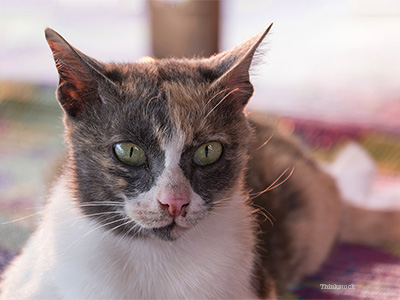You may ask yourself one day, “Why is my cat changing color?” Don’t panic, there are several reasons. Skin and hair color is determined by melanocyte cells in the skin and hair follicles. Those cells produce melanin which in turn produce the color. When your skin is exposed to the sun, those cells are stimulated to produce more melanin. That’s how you get a suntan. But what can cause the opposite result -- especially in your cat?

Color is genetically determined
Obviously cats come in many different colors so some of them have more or less pigment to start with. Cats can even be albinos – or basically lacking in pigment altogether. In fact, did you know that in spite of their characteristic dark ‘points,’ Siamese cats actually have a form of partial albinism? Even more interesting is the fact that their coloration patterns in those ‘pointed' breeds of cats are temperature dependent. The production of the pigment is dependent on the action of a particular enzyme and the action of that enzyme is temperature dependent. It only works below a certain temperature. That’s why the warmer parts of a Siamese cat’s body are lighter in color while the cooler parts (like the face, feet, tail and ear tips) are more darkly pigmented1.
Environment can affect color
Given the temperature dependent color of Siamese cats, they are especially prone to color changes associated with prolonged variations in temperature. If you move with your Siamese cat to a warmer climate, her ‘points’ may well turn lighter. You should also be prepared to see coat color changes if your Siamese cat is shaved for any medical or surgical procedures. Afterward, that first hair re-growth will occur on less insulated, cooler skin so there will likely be a darker patch, but then the next cycle should bring back the lighter, ‘original’ color.
You might also have noticed that some black cat’s hair turns a more reddish in color with sun exposure. While that is just a natural sun-induced lightening, studies have also shown that black cats that are fed a diet that is deficient in the amino acids, tyrosine and phenylalanine, will likewise develop reddish-brown hair in a change that is reversible once their diet is properly rebalanced2.
Diseases can cause pigment changes
For instance, Vitiligo is a hereditary disorder in cats that causes white areas to appear as the cat matures. These spots typically occur around the nose and eyes but do not create any health problems for the cat3. Siamese cats can also develop a similar lightening that occurs specifically around both eyes called Bilateral Periocular Leukotrichia. In this case the condition usually occurs after some stress in the cat’s life like pregnancy or because of some systemic illness4.
Immune-mediated diseases, like lupus erythematosus, can occur in cats where the cats own antibodies attack different parts of the skin resulting in damage and depigmentation, but luckily this condition is extremely rare in cats.
In general, depigmenting changes in your cat are most likely due to benign conditions that do not cause serious consequences to your cat’s overall health. However, sometimes that is not the case and an underlying illness or dietary imbalance needs to be specifically addressed. It is up to you and your veterinarian to evaluate your cat and to perform whatever diagnostic tests are necessary in order to distinguish between the two so that you can respond appropriately.
If you have any questions or concerns, you should always visit or call your veterinarian -- they are your best resource to ensure the health and well-being of your pets.
1. "Enzyme Function Dependent On Temperature." Wilsons Syndrome. Web.
